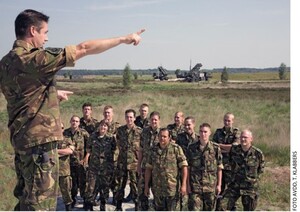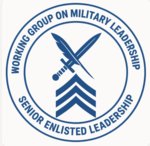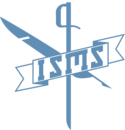Leadership, Command and Control and Basic Competences
 Sense-making, trust, stress, group cohesion and resilience, case studies, cultural awareness, gender, communication skills, mediation & negotiation, self-reflection, organizational culture, diversity management, temporary units, physical and psychological characteristics, human factors analysis, cognitive abilities, recruitment and selection, education and training, post-traumatic stress, military medicine.
Sense-making, trust, stress, group cohesion and resilience, case studies, cultural awareness, gender, communication skills, mediation & negotiation, self-reflection, organizational culture, diversity management, temporary units, physical and psychological characteristics, human factors analysis, cognitive abilities, recruitment and selection, education and training, post-traumatic stress, military medicine.
Dutch troops in the field

Developing Science for Command Senior Enlisted Leaders
Panel Discussion and Book Project
Eric Begin (CA), Denys Beskrovnyi (UE), Jean-Louis Proteau (CA), Kevin Mathers (NATO), Ludek Kolesa (CZ), Valeria Bernik (SI), David Last (CA)
In contemporary military operations, Command Senior Enlisted Leaders (CSELs) are part of a Command Team, supporting unity of command and serving as the relational backbone that secures cohesion, coordination, and adaptability—yet scholarship on the military profession has largely centered on the role of the Officer.
This Panel reframes Senior Enlisted Leadership as a distinct professional expertise in the human domain—the relational field of trust, norms, tacit knowledge, and routines through which units coordinate and adapt. In this domain, CSELs translate command intent into collective action: they connect crews and companies, set pace and standards, sustain confidence and tempo, and manage the friction where plans meet practice. Their careers are “inverted”: starting as technical specialists, they broaden—through experience—into relational generalists who steward culture, learning, and discipline across units; their leadership is collective and networked rather than merely individual or positional. Enlisted leadership functions as a human combat technology that flourishes under mission command in democratic systems and is difficult to reproduce in authoritarian ones—together, these confer a durable competitive edge. Yet within an otherwise tightly codified military organization, the Command Senior Enlisted Leader (CSEL) embodies a structural paradox: possessing little formal authority but considerable functional influence—enabling forms of leadership that formal command cannot readily perform.
The panel asks: What do command SELs do, and how do they prepare? What should they learn early—how early, and where? What are the implications of the inverted career? How do NCOs differ from officers, and how do they leverage their position as senior enlisted leaders?
Current Chair and contact for working group:
Dr. Petrus Hendrikus Johannes Olsthoorn
Associate Professor in Military Leadership and Ethics, Netherlands Defence Academy
Email Website

Peter Olsthoorn is Associate Professor in Military Leadership and Ethics at the Netherlands Defence Academy. Besides leadership and ethics, he teaches on armed forces and society, war and the media, and on ethics and fundamental rights for Frontex, the border guarding agency of the European Union. His research is mainly on topics such as military virtues, military leadership, military medical ethics, armed drones, and the ethics of border guarding. Among his publications are the monographs Military Ethics and Virtues: An Interdisciplinary Approach for the 21st Century (Routledge, 2010), Honor in Political and Moral Philosophy (State University of New York Press, 2015) and the edited volume Military Ethics and Leadership (Brill, 2017).
Co-chair
Daniel Packham, PhD
Postdoctoral Fellow, Department of Leadership and Command & Control, Swedish Defence University.
Daniel.packham@fhs.se
Website: Daniel Packham
Past Chairs:
Soili Paananen, Finnish National Defence University 2013-2021
Aki-Mauri Huhtinen, Finnish National Defence University 2008-2013
Description
The Working group Leadership, Command and Control, and Basic Competences is a multidisciplinary, international and networking working group which aims at enhancing knowledge and understanding of military leadership-related issues.
Topics
The range of topics included in the working group is wide and includes different aspects of leadership, such as leadership-as-skills and abilities, leadership-as-practice, leadership-as-communication, negotiation and networking, leadership-as-sensemaking, leadership education, training, learning-on-the-job, and professional development as well as leadership in different environments. The working group is especially keen on research which is contextualized in crisis management environments.
Scope
The working group offers for researchers a forum where topics about military leadership-related issues are analyzed and discussed during ISMS conferences as well as through research and publications.
Recent publications
Paananen, S. 2021. The education and training of military leaders for crisis management environments: perceptions of its suitability for adaptive expertise. In M. Nuciari & E. Olivetti (Eds.) Leaders for tomorrow: Challenges for military leadership in the age of asymmetric warfare. Advanced sciences and technology for security applications. Cham: Springer, 63–81. https://link.springer.com/book/10.1007/978-3-030-71714-8
Articles:
Ihatsu, T., Paananen, S. & Sederholm, T. 2021. Violence resembling terrorism – From the First responder viewpoint. Journal of Applied Security Research. https://doi.org/10.1080/19361610.2021.1889895
Paananen, S. 2020. Sociomaterial relations and adaptive space in routine performance. Management Learning 51(3), 257–273. DOI: https://doi.org/10.1177/1350507619896079
Paananen, S., Häyhä, L. & Hedlund, E. 2020. Diversity in teams: Perceptions of team learning behaviour in a military staff exercise. Scandinavian Journal of Military Studies 3(1), 1–17. DOI: https://doi.org/10.31374/sjms.6

 Sense-making, trust, stress, group cohesion and resilience, case studies, cultural awareness, gender, communication skills, mediation & negotiation, self-reflection, organizational culture, diversity management, temporary units, physical and psychological characteristics, human factors analysis, cognitive abilities, recruitment and selection, education and training, post-traumatic stress, military medicine.
Sense-making, trust, stress, group cohesion and resilience, case studies, cultural awareness, gender, communication skills, mediation & negotiation, self-reflection, organizational culture, diversity management, temporary units, physical and psychological characteristics, human factors analysis, cognitive abilities, recruitment and selection, education and training, post-traumatic stress, military medicine.
